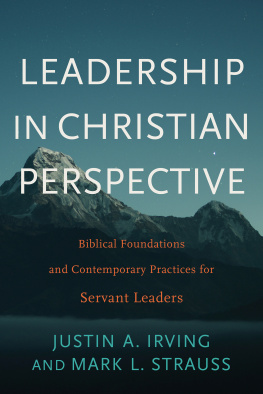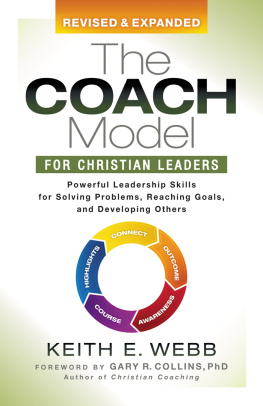Philip SA Cummins - Building Christian Leadership in Schools
Here you can read online Philip SA Cummins - Building Christian Leadership in Schools full text of the book (entire story) in english for free. Download pdf and epub, get meaning, cover and reviews about this ebook. year: 2015, publisher: CIRCLE, genre: Business. Description of the work, (preface) as well as reviews are available. Best literature library LitArk.com created for fans of good reading and offers a wide selection of genres:
Romance novel
Science fiction
Adventure
Detective
Science
History
Home and family
Prose
Art
Politics
Computer
Non-fiction
Religion
Business
Children
Humor
Choose a favorite category and find really read worthwhile books. Enjoy immersion in the world of imagination, feel the emotions of the characters or learn something new for yourself, make an fascinating discovery.
- Book:Building Christian Leadership in Schools
- Author:
- Publisher:CIRCLE
- Genre:
- Year:2015
- Rating:4 / 5
- Favourites:Add to favourites
- Your mark:
- 80
- 1
- 2
- 3
- 4
- 5
Building Christian Leadership in Schools: summary, description and annotation
We offer to read an annotation, description, summary or preface (depends on what the author of the book "Building Christian Leadership in Schools" wrote himself). If you haven't found the necessary information about the book — write in the comments, we will try to find it.
Building Christian Leadership in Schools — read online for free the complete book (whole text) full work
Below is the text of the book, divided by pages. System saving the place of the last page read, allows you to conveniently read the book "Building Christian Leadership in Schools" online for free, without having to search again every time where you left off. Put a bookmark, and you can go to the page where you finished reading at any time.
Font size:
Interval:
Bookmark:
Dr Philip SA Cummins with
Dr Stephen Hinks and Gaynor MacKinnon
Dr Philip SA Cummins May 2012
This book is copyright. Apart from any fair dealing for the purposes of private study, research, criticism or review permitted under the Copyright Act 1968, no part may be stored or reproduced by any process without prior written permission.
National Library of Australia
Cataloguing in publication data:
Building Christian Leadership In Schools
ISBN 978-0-9872869-3-2
Please refer to the National Library of Australia website for cataloguing in publication details.
Not that I have already obtained this or am already perfect, but I press on to make it my own, because Christ Jesus has made me His own. Brothers, I do not consider that I have made it my own. But one thing I do: forgetting what lies behind and straining forward to what lies ahead, I press on toward the goal for the prize of the upward call of God in Christ Jesus. Let those of us who are mature think this way, and if in anything you think otherwise, God will reveal that also to you. Only let us hold true to what we have attained. Brothers, join in imitating me, and keep your eyes on those who walk according to the example you have in us.
Philippians 3:12-17
Instead, whoever wants to become great among you must be your servant, and whoever wants to be first must be your slave just as the Son of Man did not come to be served, but to serve, and to give His life as a ransom for many.
Matthew 20:26-28
INTRODUCTION
Why Do You Want To Lead?
Is it to be more like someone youve known or seen modelling on others? Is it the ability to have control, to have things done in a particular way exerting power? Is it to be able to make a difference in the lives of others and effect change demonstrating influence? Is it to be able to help others do what they do being a servant?
We lead for a number of reasons. In this chapter, we will start the leadership journey by exploring a Christian model of leadership and the values that underpin it. More specifically, we will examine concepts that relate to:
- Leadership requirements.
- Vision and values.
- Leading the management of the school.
In this book, we define leadership as the art of motivating, directing and influencing people so that they work together willingly to achieve the goals of the team or the broader organisation to which the team belongs.
Leaders build relationships within teams. Leaders help teams to define identities. Leaders help teams to achieve tasks. All members of a community should be capable of exercising leadership in different contexts and the more that leadership is encouraged, the more it flourishes.
At the heart of every team are its values. In many ways values are the most differentiating aspect of all in practising leadership. Leaders who act on the basis of a solid set of positive Christian values such as service, loyalty and integrity and who insist that their team does as well, are far more likely to contribute positively to society and to feel good about what their team is and does. What makes a Christian foundational set of values so enduring, transformative and effective in relation to any other is that it is based on the loving relationship of God with us as individuals. It is Gods power acting through our faith that gives us capacity in this respect.
By the end of this chapter, you should know about and understand the following topics:
- Being a Christian leader.
- Your values, your leadership.
- A contemporary framework of Christian values.
- Understanding the nature of leadership.
- Being a Christian leader in a school.
What do we mean by Christian leadership?
Being Christian, being in a relationship with God, Who served us by laying down His life for us in Jesus, initiates a very different approach to leadership. We take Jesus as our primary role model. For this, we need to ask some searching questions:
- How did Jesus lead?
- What did this leadership look like?
- Why did He lead in this way?
- What was the outcome?
There are many possible ways for us to approach the Gospels to determine how Jesus led in His time here on earth. To help us understand Christian leadership, we begin with the Gospel of Matthew, in which Jesus teaches and models for us the fundamentals of servanthood, which is, in turn, the basis of our philosophy of servant leadership. This can be seen in the ideas set out below.
Jesus calls us to lead as stewards
In Matthew 5:2-11, Jesus preaches His great sermon, The Beatitudes. In it, He identifies that Gods blessings will go towards those:
- Who are humble of means and character (vv3-5).
- Who seek righteousness and pursue it (v6).
- Who act with mercy, are pure in heart and who strive for peace (vv7-9).
- Who are reviled and persecuted for their commitment to righteousness (vv10-12).
There is so much in this respect that can be drawn from this remarkable passage. Jesus begins His teaching ministry with the importance of Kingdom values this helps to define what values are. The way in which God has acted towards us shapes what we understand, value, protect and promote; Gods gifts of grace and salvation illustrate these values for us. This perspective of the purpose of leadership, unique for its time and still so powerful and relevant today, makes it clear that there is no room for arrogant and self serving leaders. Instead, He presents a vision of leaders who are genuine stewards: serving, caring for and protecting others. He shows us how to be leaders who are not afraid to take up the right cause and to wear suffering as a result of it. This is at the heart of what we call servant leadership.
Jesus calls us to lead by example
In Matthew 5:14-16, Jesus calls on His followers to be an example for the whole of humanity. They are encouraged that as they embody Kingdom values, they are the light of the world: like a city on a hill visible to all, as a lamp on a stand that gives light to a whole house. Our purpose is to allow others to see what it is that we do and thereby allow our actions to give glory back to God.
Jesus calls us to found our lives on His word and on Christ like values
In Matthew 7:24-27, we are told to build our lives on Jesus words as though we are building our houses on foundations of rock. Jesus cautions us that it is only in this way that we can avoid calamity when times of strife arise. So as we approach the topic of leadership in schools, we must do so as people listening to and obeying Jesus words. At the same time, we need to recognise that Christ like values can and do have a transformational impact on people and communities through His Spirit.
Jesus calls us to live and lead through love
In Matthew 22:34-40, Jesus Great Commandment makes it clear that the principles for Christian lives can be boiled down to two simple, powerful and challenging precepts:
- Loving God with all of our heart and soul and mind (v37).
- Loving others in the same way that we love ourselves (v39).
Love is the overriding principle. So the essence of our leadership must be to express our love for others as fully and as completely as we can, bearing in mind that love for God must come first. In other words, we love by serving God and others (see also John 13).
Jesus calls us to encourage and teach others to follow His way
Font size:
Interval:
Bookmark:
Similar books «Building Christian Leadership in Schools»
Look at similar books to Building Christian Leadership in Schools. We have selected literature similar in name and meaning in the hope of providing readers with more options to find new, interesting, not yet read works.
Discussion, reviews of the book Building Christian Leadership in Schools and just readers' own opinions. Leave your comments, write what you think about the work, its meaning or the main characters. Specify what exactly you liked and what you didn't like, and why you think so.












